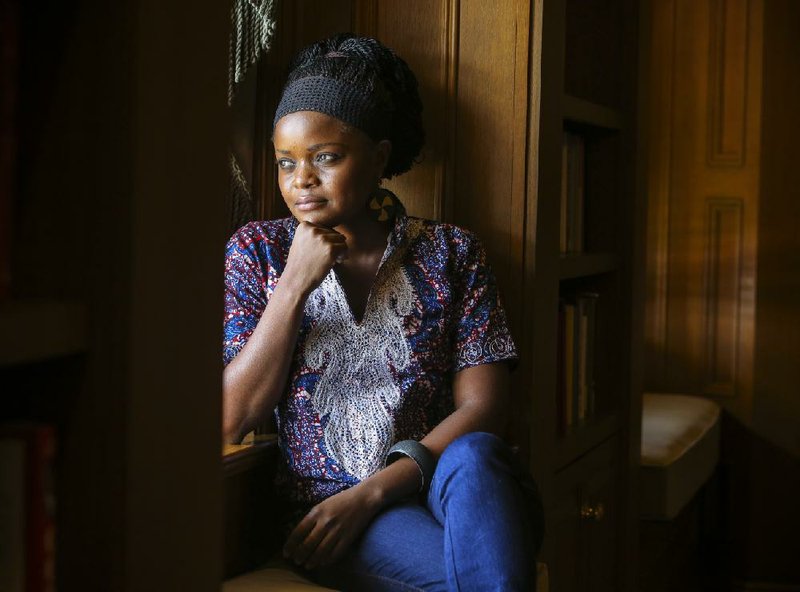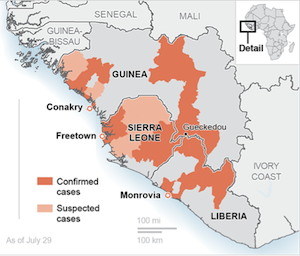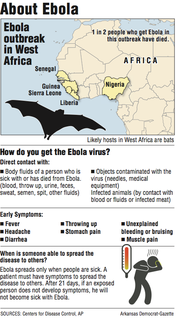Every phone call Clinton School of Public Service student Georgia Genoway makes to her father in Liberia begins with one question.
RELATED ARTICLE
http://www.arkansas…">Dallas Ebola patient grows sicker; condition critical
"I ask him, 'Are there any cases of Ebola yet?' He'll say, 'No, no Ebola here,'" Genoway said. Her father, George, lives in Grand Gedeh, a county in the eastern portion of the West African nation of Liberia.
More than 3,300 people have died from the disease and more than 7,000 cases have been reported since March, making it the worst outbreak since the virus was discovered in 1976. The World Health Organization has reported that more people have died from Ebola in the past seven months than in every other outbreak combined.
The majority of the cases are confined to the West Africa nations of Sierra Leone, Guinea, Liberia, Nigeria and Senegal. On Tuesday, Thomas Eric Duncan became the first case of Ebola to be diagnosed in the United States -- 10 days after he traveled from his home in Liberia to Dallas. He was listed Saturday in critical condition in a Texas hospital.
Surrounded by floor-to-ceiling bookcases in the library of the University of Arkansas Clinton School of Public Service in Little Rock, Genoway kept her spine straight as she leaned forward and plucked up a fold of her heavy, blue-and-yellow linen skirt.
In Monrovia, "a lot of the businesses are closed. You can't find nonessential stuff. Not even cloth to sew skirts," she said, rubbing the material between her fingers. "This place is a ghost town. There is almost nobody in the streets. They're asking them to stay home. People are not even buying things like stationery."
Genoway arrived in Little Rock from Monrovia, Liberia, on Aug. 16 to begin a two-year track to earn a master's degree in public service from the Clinton School.
In Liberia, Genoway was involved in social work and volunteered for the Liberian National Red Cross and Gbowee Peace Foundation, working with young people on health advocacy issues.
Ebola has touched everyone's lives in Africa, she said. Schools are shutting down because teachers are afraid to show up. Overwhelmed hospitals and health service centers are turning people away in droves, leaving them to fend for themselves. Bodies are being collected dozens at a time.
Some of Genoway's fellow classmates, friends and their relatives have died from the disease. One classmate contracted the disease when he helped bury the body of a cousin, but he survived.
Genoway -- whose 2-year-old daughter is still in Liberia with Genoway's mother -- said just like every other crisis, it is the "women and children who suffer the most."
"It's not even about my mother and my daughter. It's about all women and children," Genoway said. "A woman gave birth to twins on the side of the road because the hospital would not take her."
Those who aren't infected are suffering, as well.
"People are dying from malaria, from diabetes just because they cannot get care," Genoway said.
Gil Gildner -- a Little Rock photographer who has been in Liberia since last week documenting the outbreak for service organizations like Samaritan's Purse, Society for International Ministries and Doctors Without Borders -- said the situation in Liberia is bleak and "is only getting worse."
"People are dying everywhere, but it's not the fault of the hospitals. The hospitals are at double capacity, and admitting any more patients would increase the chances of infection for everyone," Gildner said. "SIM, the organization with the best-performing Ebola unit with the highest survival rate in Liberia, is operating a 40-bed unit with as many as 78 patients."
Genoway clenched her jaw, a steely glint in her eyes. She said she knows why Ebola has overcome West Africa and has devastated her homeland.
"When it first crossed the borders, the government said it was not true. Now they said it is true, but people say no," Genoway said. "That's how it spread. They made an error by not taking it seriously from the start. If they had treated it properly and educated people from the first case, the deaths would not have increased."
Ebola is not an easy disease to transmit from person to person, said Dr. Robert Bradsher Jr., the director of the division of infectious diseases at the University of Arkansas for Medical Sciences in Little Rock.
"People in West Africa have not been educated on the disease, so there are practices that have been happening that allow the spread of the virus," Bradsher said. "That's not an issue that is faced in the United States."
Ebola -- a virus that can impair kidney and liver function, and lead to external and internal bleeding -- presents itself within two to 21 days of exposure. Early symptoms can include fever, severe headache, diarrhea, nausea, stomach and muscle pain and unexplained bleeding or bruising.
According to the U.S. Centers for Disease Control and Prevention, Ebola cannot be transmitted through the air, but only through direct contact with the bodily fluids of a person who is sick with or has died from Ebola; through objects contaminated with the virus; or through contact with or consumption of infected animals.
"People are dying in homes and burying the bodies themselves," Genoway said. "People don't know; they are not educated."
The United States has the health infrastructure, the education and communication system -- as well as the proper equipment and medications -- to identify, isolate and treat the virus, said Dr. Tom Cummins, chief medical officer for CHI St. Vincent in Little Rock.
"There are misconceptions about how contagious this disease is. They seem to think it's as contagious as the cold or flu," Cummins said. "I think the everyday Arkansan has very little to fear from this. Do not let the fear of Ebola dictate your life. I think a lot of people are so nervous, but it's a different culture and a different environment over there than it is in the U.S."
Arkansas Department of Health spokesman Kerry Krell said the state began in August distributing guidelines and precautions concerning Ebola to the state's health-care facilities, schools and colleges, and specific businesses with employees from West Africa.
"The big thing is to ask for a patient's travel history and trying to identify anyone coming into Arkansas from those ... countries," Krell said. "We let them know, 'Here's a patient that has a fever. What do you do now?'"
Bradsher said UAMS has been preparing for months by holding training sessions and working with the CDC and the state Health Department to establish protocols. Signs are posted in the emergency room and other treatment areas reminding patients to notify health care providers if they have traveled from any of the outbreak areas.
Duncan, the Ebola patient in Dallas, was sent home the first time he sought treatment at Texas Health Presbyterian Hospital, even though he had told the intake nurse that he had recently traveled from West Africa.
UAMS spokesman Leslie Taylor said the medical center has implemented an electronic record system that gives every member of the health care team equal access to all of the information gathered on a patient.
"Staff are asking patients at all of our access points -- clinic, admissions, emergency department -- about their travel and have processes in place to immediately isolate patients if necessary," Taylor said.
Dr. Shane Speights, vice president of medical affairs for St. Bernards Medical Center in Jonesboro, said the strongest point of defense may be in one key place.
"It's the lady that sits at the registration desk," Speights said. "Those are the ones we recognized very quickly that we need to aggressively train. They need to get a travel history and ask, 'Have you been to the Dallas area lately, to West Africa?'
"I don't think any system is foolproof, but I think we do a pretty good job. The key is to keep everybody alerted and in the loop."
Baptist Health spokesman Cara Wade said the organization is following all CDC guidelines as they pertain to Ebola and has instituted required specific screening questions for its health care providers.
"We also have an infection control policy and procedure specifically for Ebola. The key to preventing the spread of Ebola is to identify and isolate potential cases as quickly as possible," Wade said.
Jessica Eldred, spokesman for Mercy Northwest in Rogers, said isolation rooms are in the emergency department and in every unit in the hospital.
"Placing a patient suspected of having Ebola in an isolation room is to ensure health care providers are taking the highest level of precaution," Eldred said. "All providers and co-workers serving patients in the isolation rooms wear a Respiratory N95 Mask. These masks capture even the smallest particles. All providers and co-workers also wear gloves, gowns and a face shield or goggles."
The CDC and the Arkansas Department of Health have also advised the state's schools to reach out to students who have traveled from the outbreak areas. If an exposed person does not develop symptoms after 21 days, he will not become sick with Ebola, according to the CDC.
At the University of Arkansas at Fayetteville, health center officials tracked the health of some students for 21 days in August and September.
"We will continue to make contact with anyone who travels from these countries and will follow up as required by the CDC and ADH," spokesman Steve Voorhies said.
Harding University spokesman Hannah Beall Owens said the Searcy university has only one student from Liberia, and she was monitored for 21 days but had not been in any of the affected areas in the West African country.
At the Clinton School, Genoway also was monitored for 21 days.
It's basic precautions like isolating those infected, frequent hand-washing and proper hygiene, and ensuring those caring for the sick are given the proper protective gear that officials say will help stop the virus.
"You have to take it really serious and create awareness," Genoway said.
SundayMonday on 10/05/2014


